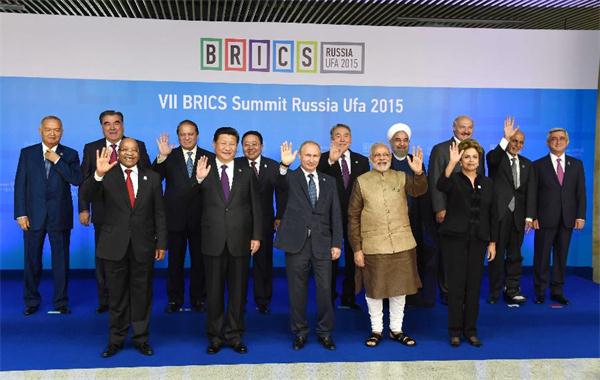
Chinese President Xi Jinping poses for photos with leaders of the Shanghai Cooperation Organization (SCO) members and observers, the Eurasian Economic Union (EEU) leaders, leaders of invited countries and the BRICS nations, namely Brazil, Russia, India, China and South Africa in Ufa, Russia, July 9, 2015. (Xinhua/Rao Aimin)
The two-day meeting of the Council of Shanghai Cooperation Organization Heads of State, which opened on Thursday in Ufa, capital of Russia's Bashkortostan Republic, adopted procedural steps for the current observers India and Pakistan to join the organization, as part of its expansion program.[Special coverage]
The SCO meeting followed the seventh BRICS Summit in the same city on Wednesday and Thursday. It is also the second time this year that Chinese President Xi Jinping has visited Russia. At the invitation of his Russian counterpart Vladimir Putin, Xi attended the Victory Day parade in Moscow just two months ago.
The SCO currently has six member states - China, Russia, Kazakhstan, Tajikistan, Kyrgyzstan and Uzbekistan. The admission of India and Pakistan will be the first time the bloc has added full members.
Apart from the expansion plan, the efforts to inject new momentum into the SCO-led multilateral cooperation are also worth noting. The ongoing summit is expected to ratify the SCO Development Strategy until 2025 and strengthen anti-drug trafficking cooperation between the SCO members, shaping the future layout of the bloc's prime tasks.
Realizing China's Silk Road Economic Belt initiative also requires Beijing to work closely with all the states along the "road", many of which are its SCO partners, in order to make concrete progress.
Moscow, which has suffered from the Western economic sanctions due to its involvement in the Ukrainian crisis since 2013, hopes to give its best political performance at the two summits, securing international support to help it recover.
On the sidelines of the Ufa-based summits, Xi and Putin will meet to push for further cooperation between their countries, working on a good model for an equal and reciprocal major power relationship. Two months ago, in their last meeting, they witnessed the signing of more than 30 cooperative deals, including financing, aerospace and railways.
Seeing each other as the most important neighbor and strategic partner, Beijing and Moscow have begun to play a bigger role in global affairs thanks to their deepening coordination.
Politically, both countries engage in timely communication to reach consensuses on their policies and global issues. And the complementary nature of their resource endowments and economic structures, as well as their shared non-aligned security mindsets, have empowered the China-Russia relationship to act as a prominent safeguard for regional peace. Also, the increasing people-to-people and cultural exchanges between the two countries are likely to underpin the bilateral strategic partnership.
It is foreseeable that the demonstration effects of a healthy bond between China and Russia will top the agenda at this year's SCO summit, prompting the members to make accelerated efforts to jointly forge a community of shared destiny, featuring inclusive multinational relations.
The "Shanghai Spirit" of mutual trust, mutual benefit, equality, consultation, respect for cultural diversity and pursuit of common development, has made the SCO an effective regional organization, and it will further boost in-group transnational cooperation after India and Pakistan become member states.
The latest expansion will generate more opportunities for multilateral cooperation, thus giving the bloc a better say in the Eurasian, even global affairs. But it may affect the SCO in other ways, given the latent dangers attached to the two new members, which are constantly challenged by terrorism, separatism and extremism.
It has been five years since India and Pakistan became SCO observers, and they have developed sound relations with the six member states in the pursuit of a fair and just international order. The SCO has been very cautious in admitting the observers and it has prepared well-considered plans for the potential problems. But with the expansion of its membership, the increasingly consolidated regional organization will be able to assume more responsibility for global stability and prosperity.
The author Sun Zhuangzhi is secretary general of the Shanghai Cooperation Organization Research Center, affiliated to the Chinese Academy of Social Sciences.
















































